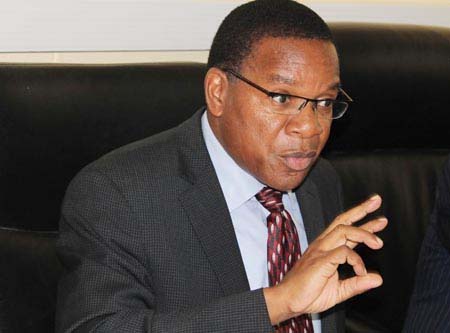No alternative to Zanu-PF rule as long as sanctions stay

Kennedy Mavhumashava
PRESENTING the Sadc Election Observer Mission final report on the 31 July elections recently, head of delegation, Mr Bernard Membe made an interesting observation on the illegal Western sanctions on Zimbabwe.
The 2 September report confirmed the observer group’s preliminary opinion issued exactly a month earlier that the elections were free, peaceful, credible and representative of the will of the people. It also urged the Government to undertake public media reforms, but at the same time, called for an end to pirate radio and television broadcasts into Zimbabwe from The Netherlands, America and other Western and African capitals.
But what caught the attention of many were his off-the-cuff remarks on the illegal sanctions and what he thought was their current and possible long term impact on electoral choices of Zimbabweans.
“Let me tell you this passionately from my heart and if there are opposition leaders here and if there are opposition people in this conference you know this question of sanctions must be fought by all parties,” he said.
“To tell the world to remove the sanctions because if you don’t it’s very difficult for the opposition to win elections. As long as sanctions are there this Zanu-PF will prevail for 100 years to come if you hear me. Once voters are told that they are suffering because of sanctions and you have agents that are working in favour of these sanctions in the country then you are putting yourself in a very awkward position electorally.
“You will never win and so my challenge and the challenge that I am giving to you all the ruling party and the opposition; the question of appealing to the world to remove sanctions in Zimbabwe is fundamental not only to the people of Zimbabwe but it also gives a chance to the opposition to come to power in 2018.”
In short, Mr Membe said the local opposition, which must mean MDC-T as it is the biggest opposition party in Zimbabwe, can only have a chance of winning elections if the illegal sanctions are lifted. Voters, he said, recognise that economic sanctions are the primary cause of their suffering and would always punish the party that abets that suffering while on the other hand, supporting that party which is evidently fighting to have those sanctions removed.
But the question to ask is, given the history of MDC-T and the local political climate; can the party actually survive as a viable political option in a stable socio-economic environment that is not under sanctions as the Tanzania Foreign Minister suggests?
There are no easy answers to this, but it is highly unlikely that the party that has campaigned, primarily on human suffering for 14 years, would survive and actually stand a chance of winning a national election when the people’s suffering eases.
This is so because Europe and America imposed the illegal sanctions, with open support from MDC, to collapse the economy, which in turn would cause immense national suffering to achieve only one fundamental political objective of getting people to overthrow Zanu-PF, either forcibly or peacefully through an overwhelming vote for MDC-T.
Indeed the economy is struggling as a result of the sanctions – industries are closing, thousands are jobless, hospitals are struggling, the little resources available cannot adequately boost agriculture. People are suffering. They suffered the worst in 2007-2008. MDC-T built its campaign message exactly around the discontentment arising from the effects of sanctions, promising the electorate that the misery would only end if they voted for it and warning of an intensification of the depravation if they dared vote for Zanu-PF.
In the March 2008 harmonised election, that primary political objective nearly materialised as the West had programmed. Mr Morgan Tsvangirai got the highest number of votes in the presidential race and his party secured 100 seats in the Lower House, compared to Zanu-PF’s 99. That was to become the best performance by MDC-T since its creation. It is not difficult to see that the more the people suffered over the past 13 years, the more they tended to vote for MDC-T, and against Zanu-PF.
“To separate the Zimbabwe people from that man, (President) Robert Mugabe and Zanu-PF, we are going to have to make their economy scream, and I hope you senators have the stomach for what you have to do,” US diplomat, Mr Chester Crooker said in 2001 during consultations that led to America enacting the Zimbabwe Democracy and Economic Recovery Act, the piece of legislation on which the US sanctions on Zimbabwe are based.
Around the same time, Mr Tsvangirai told a rally: “Mati muri kufa nenzara?” to which his audience replied, “Eeeee!” He continued, “Muchanyatsa kushaisisa chaizvo chaizvo.” (You say you are suffering? That will continue if you don’t vote for me).
Both statements confirm that the illegal sanctions were imposed to strangle the economy to achieve one political outcome. Europe and America linearly thought that if they imposed sanctions so the economy screams, that would create animosity between the people and Zanu-PF, and ultimately get the revolutionary party out and MDC-T in. It was a matter of one plus one equalling two. However, 31 July must have proved that one plus one is not necessarily two; it can in reality be zero, one, even five.
Indeed there was a time when the economy really screamed, when inflation became virtually incalculable, shop shelves and fuel stations empty and people going hungry and angry.
Zanu-PF says the whole range of Western illegal sanctions on Zimbabwe have prejudiced the economy of $42 billion, an enormous sum of money for an economy of our size. This does not include the human cost, which cannot be put in dollars and cents. However, the political outcome desired in the West has not come to pass. People have not been separated from Zanu-PF.
America, Europe and their local contacts must be asking themselves why their assumptions have not happened the way they thought they would. In fact, why they have backfired? The punitive measures were meant to be a weapon to achieve a political end, but the victim has cleverly turned it into a kind of defensive mechanism. It is like an intended victim of an armed robbery bravely turning the sword against the intruder.
The revolutionary party has managed to articulate the sanctions story so convincingly that the masses now know that they are an unprovoked act on aggression by powerful nations with vested interests so as to pre-determine political choices and processes in Zimbabwe. Apparently, the majority of Zimbabweans understand that the sanctions are there, not as a response to alleged suppression of human rights, lack of rule of law as the West alleges, but as punishment for the land reform programme and their government’s nationalistic policies. Lessons from other countries have shown that sanctions do not necessarily result in the attainment of desired political ends. Cuba, a small country of 11,2 million is probably the best example. She has been under US sanctions for 53 years but the people have not been separated from their communist government.
So can MDC-T survive in an environment without sanctions, even if it continues to compromise itself as a Western puppet? If the sanctions are lifted, normal relations between the Zanu-PF government and the West are expected to naturally return. Critical support from international multilateral agencies and from bi-lateral sources controlled in America and Europe would resume. Diamonds from Chiadzwa would find their way to Antwerp, Belgium, at their full price, not the fraction they are being sold for in a sanctioned environment. If that happens, the economy is likely to stabilise, recover and begin to grow much more rapidly.
Given that the electorate has tended to vote more for MDCs and against Zanu-PF when the economy was at its worst as indicated earlier on, can the opposite happen when the economy begins to do well? The voting pattern that emerged on 31 July is probably the kind of trend to expect in a stable environment. Zanu-PF regained its control of parliament, and retained the presidency most overwhelmingly.
Rather than giving the MDC-T or the opposition in general a lease of life, a functioning economy without foreign interference would most likely close any space for alternative political thinking in the country. So the assumption that if sanctions are removed, the opposition would suddenly stand the chance of being voted into office and that if the measures remain it would take 100 years for that to happen, may not be exactly correct. It could be a zero-sum-game of sorts – the opposition that supports sanctions would continually lose elections for as long as sanctions, which they support, remain and a stable environment without sanctions would most likely mean the electorate would see no need to seek political alternatives, particularly those not rooted in the national interest.
It is the illegal sanctions that actually give or gave MDC-T some political leverage against Zanu-PF, although at the same time, they are also discrediting the party in the eyes of nationalists. MDC-T sees them as an advantage, not a disadvantage. This explains why MDC-T has been publicly calling for sanctions to be removed but privately urging them to be maintained. Without sanctions and their negative socio-economic effects, MDC-T might have no political situation to manipulate.











Comments